“I’m only asking for basic respect.” – Dr. Beth Upton, in the face of a hostile courtroom, media, and world.
Her fucking bravery is amazing. 💖
“I’m only asking for basic respect.” – Dr. Beth Upton, in the face of a hostile courtroom, media, and world.
Her fucking bravery is amazing. 💖
After “fixing” BBC News’ RSS feeds I noticed that I was seeing less news (and, somehow, stressing less over everything happening in the USA). Turns out that in switching myself to my new system I’d subscribed to the UK edition, whereas previously I’d been on the Full edition. I’ve corrected it now in my RSS reader, but it was an interesting couple of days.
tl;dr: I accidentally stopped reading international news and I was less stressed
Anyway: if you’re not already using my improved BBC News RSS feeds, they’re at: https://bbc-feeds.danq.dev
This is a repost promoting content originally published elsewhere. See more things Dan's reposted.
In its latest attempt to erode the protections of strong encryption, the U.K. government has reportedly secretly ordered Apple to build a backdoor that would allow British security officials to access the encrypted cloud storage data of Apple customers anywhere in the world.
The secret order — issued under the U.K.’s Investigatory Powers Act 2016 (known as the Snoopers’ Charter) — aims to undermine an opt-in Apple feature that provides end-to-end encryption (E2EE) for iCloud backups, called Advanced Data Protection. The encrypted backup feature only allows Apple customers to access their device’s information stored on iCloud — not even Apple can access it.
…
Sigh. A continuation of a long-running saga of folks here in the UK attempting to make it easier for police to catch a handful of (stupid) criminals1… at the expense of making millions of people more-vulnerable to malicious hackers2.
If we continue on this path, it’ll only be a short number of years before you see a headline about a national secret, stored by a government minister (in the kind of ill-advised manner we know happens) on iCloud or similar and then stolen by a hostile foreign power who merely needed to bribe, infiltrate, or in the worst-case hack their way into Apple’s datacentres. And it’ll be entirely our own fault.
Meanwhile the serious terrorist groups will continue to use encryption that isn’t affected by whatever “ban” the UK can put into place (Al Qaeda were known to have developed their own wrapper around PGP, for example, decades ago), the child pornography rings will continue to tunnel traffic around whatever dark web platform they’ve made for themselves (I’m curious whether they’re actually being smart or not, but that’s not something I even remotely want to research), and either will still only be caught when they get sloppy and/or as the result of good old-fashioned police investigations.
Weakened and backdoored encryption in mainstream products doesn’t help you catch smart criminals. But it does help smart criminals to catch regular folks.
1 The smart criminals will start – or more-likely will already be using – forms of encryption that aren’t, and can’t, be prevented by legislation. Because fundamentally, cryptography is just maths. Incidentally, I assume you know that you can send me encrypted email that nobody else can read?
2 Or, y’know, abuse of power by police.
Last week, I discovered Geneveive Raine‘s “The Continuum”, a super-compressed image comprised of 1-pixel-tall versions of her home page’s daily banners, stitched together1.
I thought it was a beautiful idea, so I stole adapted it to produce an illustration based on the featured images of my blog posts:

I generated a horizontal version too, but I’ve used the vertical version above because it’s more-suitable for use with a HTML imagemap2.
Here’s the code I used to generate the images (and the imagemap), if you want to run it against your own WordPress-ish blog.
1 Which was in-turn inspired by Movie Iris, a tool that visualises the frames of a movie as a radial graphic.
2 What’s a HTML imagemap, you ask? You don’t need to ask: you shouldn’t be using it anyway. Relying on it means you’re setting yourself up for an accessibility nightmare. Anyway: I used one above: you can click on any “stripe” of the image to jump to the corresponding post. It needed some fighting-with because imagemaps can’t work with rescaled images, so I’ve forced the height of the image even as it resizes horizontally. Not that you’re going to click on the stripes anyway: it’s just about the worst way imaginable to navigate a blog.
It turns out my series of efforts to improve the BBC News RSS feeds are more-popular than I thought. People keep asking for variants of them, and it’s probably time I stopped hosting the resulting feeds on my NAS (which does a good job, but it’s in a highly-kickable place right under my desk).
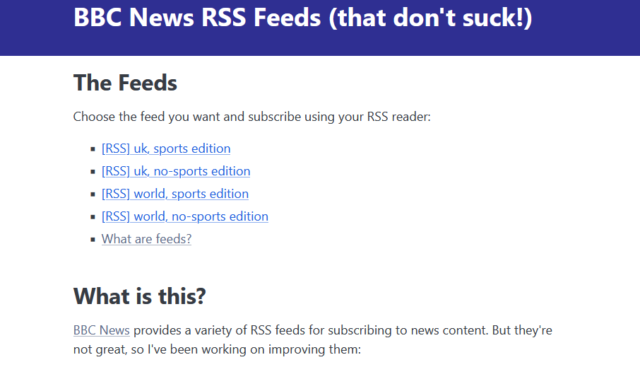
So I’ve launched BBC-Feeds.DanQ.dev. On a 20-minute schedule, it generates both UK and World editions of the BBC News feeds, filtered to remove iPlayer, Sounds, app “nudges”, duplicates, and other junk, and optionally with the sports news filtered out too.
The entire thing is open source under an ultra-permissive license, so you can run your own copy if you don’t want to use mine.
Enjoy!
Since Kev Quirk made an adaptation of Ava‘s Blog Questions Challenge I’ve been seeing it everywhere in my blogosphere circle. I’ve gotta be the last person left on Earth to do it, but it has that old-school pass-it-along meme feel, like that 2006 one about describing your friends. I’ve not been tagged by name, but both Jeremy and Garrett did a broad “you” tag, so I’m taking it.
It felt like a natural evolution of my second vanity-site. It was 1998, and my site – Castle of the Four Winds – was home to a selection of the same kinds of random crap that everybody put on their homepages at the time. I figured I’d start keeping an online diary: the word “blog” hadn’t been coined yet, and its predecessor “weblog” had only been around for a year and I hadn’t come across it.
So I experimentally started posting a few times a week.
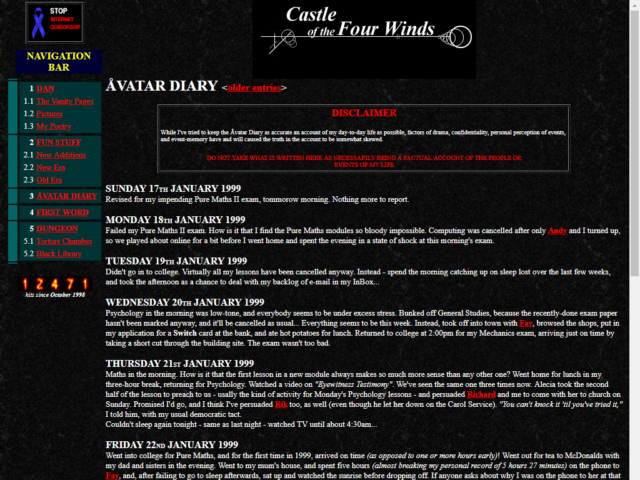
When I started blogging my site was almost entirely plain HTML2. So my original “platform” was probably Emacs.
In the Summer of 2000 I registered avangel.com and moved my diary there. I was still storing posts in static files, but used PHP wrappers to share the structure and menus across the pages. It was a massive improvement.
Later, I moved everything to the (ill-advised?) domain name scatmania.org and reimplemented in pretty-much the same way. Until…
The first real “blogging engine” I used was Flip.
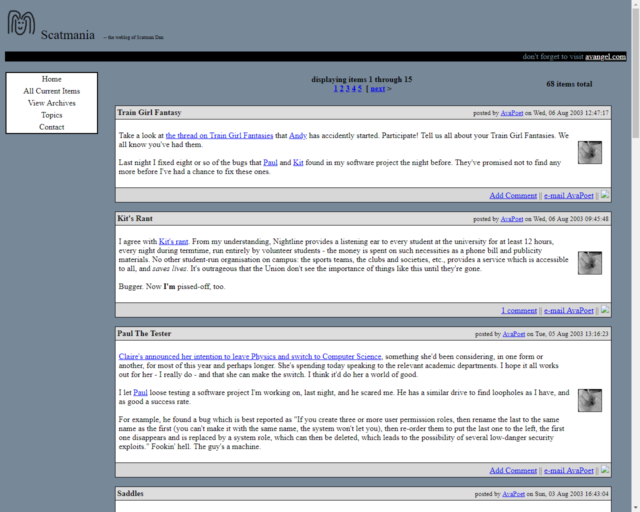
I liked Flip3: it had a raw simplicity that I’d later come to love in young versions of WordPress. And being able to edit from the Web was a huge improvement over having to edit files, especially when I was out and about: I managed to post from my dad’s BlackBerry while cycling across the Outer Hebrides, for example.
I’d have outgrown Flip eventually, but I got a nudge in that direction in July 2004. At the time, I was sharing a server with some friends and operated by Gareth, and something went wrong and the server went completely offline. The co-located server disappeared back to Gareth’s house, eventually, and while I’d recovered many of the posts from my own backups, 61 posts remain partially-incomplete to this day (if you happen to have a copy of any of them I’d love to see it!).
I brought my blog back online using WordPress, whose then-new release version 1.2 included an RSS-powered importer: this allowed me to write a little code to convert my entire previous archive into a fat RSS file and then import it wholesale. WordPress was, as remains, pretty magical – a universal blogging platform that evolved into a universal CMS – and I back in the day I occasionally argued online with Matt about technical aspects of the future direction of the project4.
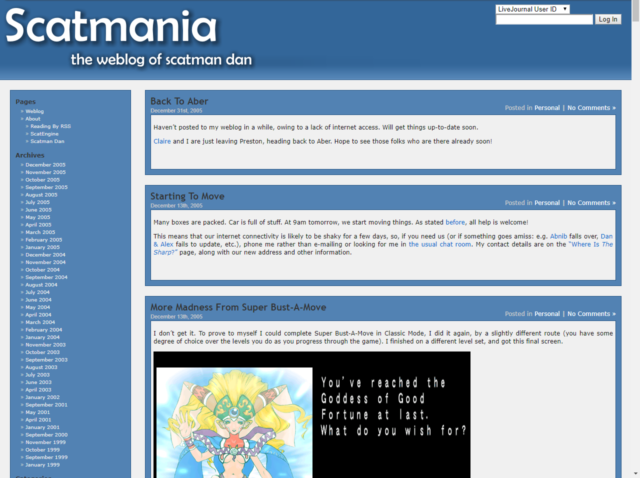
Incidentally, if you’d like to see more of my blog’s design history over the last 26+ years, I shared a lot of screenshots back in 2018.
If you didn’t know better, you might well not know I’m running WordPress. My theme and custom plugins are… well, they’re an ecosystem all by themselves. And that’s before you even get to things like CapsulePress, my WordPress-to-Gopher/Gemini/Spartan/Nex bridge, the pile of scripts I use to sync-up with the Fediverse, the PWA I use to post notes while I’m on the move, and so on.
Earlier this year I experimentally switched to ClassicPress; a fork of WordPress. There’ll doubtless be lots more to say about that, down the line5, but here’s the skinny: I don’t use Gutenberg on my blog anyway6, I appreciate having my backend be almost as high-performance as I’ve worked to make my frontend, and I enjoy most of the feature differences7.
With the exception of notes (most of which are written in a tool of my own creation and then pushed to one or both of my Mastodon and my blog simultaneously), I mostly write right into the WordPress/ClassicPress post editor.
I often write ideas, concepts, and first drafts into my Obsidian notebook and then copy/paste out when the time comes.
There’s no particular pattern, though it feels like I’m most-inspired to write exactly when I should be prioritising something else! That’s why it’s so helpful to be able to write three sentences into Obsidian and then come back to it later!
I’ve been on a bit of a blogging kick these last few years, though. Last year I wrote a massive 436 posts, although that admittedly includes PESOS‘d checkins from geocaching and geohashing expeditions. I’m a fan of Kev’s #100DaysToOffload challenge, and I’m on course to achieve it earlier than ever before, this year (my sixth consecutive year: I do the challenge strictly by calendar years!), as this post is already by 48th… all within the first 38 days of this year8.
A mixture of both. Probably most of my posts are written in a single sitting… or, at least, are written in a tab that stays open for the entire time during which it’s written.
But others spend a long time in-progress. You remember how almost a year ago I gave a talk about why Oxford’s area code is 01865? And I promised that there’d be a blog/vlog/maybe-podcast version of that talk later? Yeah: that’s been 90%-there and sitting in a draft pretty-much since then, just waiting for me to make the finishing touches (and record the vlog/podcast variants, if that’s the direction I decide to go in).
And I’ve dusted off drafts that’ve been much older than that, before, too. So it really is a mixture.
I couldn’t pick out a favourite that I wouldn’t change my mind about five minutes later. But a recent favourite might have been last Spring’s “Let Your Players Lead The Way”, which aimed to impart some of the things I’ve learned about gamemastering (especially) while being the dungeon master for The Levellers these last few years9.
Not only was it a post that had been a long time coming, and based on months of drafts and re-drafts, but also I really enjoyed writing some post-specific CSS to give it just a slightly more-magical feel.

I want to redesign the homepage to be simpler, less-graphical, and more-informational. I’m not sure how that’s going to look, yet.
I’ve been wondering about integrating some of my personal-geotracking into the design (Aaron Parecki does an amazing job of this with his dynamic site background image, for example).
I’m playing with the idea of adding a guestbook, like it’s 1998 again or something.
I’d like to tidy up my tagging taxonomy, and I’m not convinced AI is up to the task.
I need to decide how I feel about the emoji reactions feature I added in 2023. I’m still undecided. What do you think? 👍? 👎?
And as I mentioned: I’m experimenting with ClassicPress. It’s working out mostly-okay so far, but that’s a story for another post.
I feel like I’m the last person in the universe to do this quiz. But if you haven’t – and you have anything approximating a blog – then you should go next.
1 I wouldn’t recommend actually reading my older posts, though. I was a teenager, and it shows.
2 I had a slightly-fancier kind of hosting, by this point, that gave me a
cgi-bin directory into which I could compile binaries (in C) or write scripts (in Perl). My hit counter? That was a Perl script I adapted from Matt Wright’s counter.pl and “enhanced” with some flaming text using Corel
Photo-Paint.
3 While writing this post, I hunted down the original developer of Flip. He seems cool.
4 A year later he launched WordPress.com, which then evolved into the foundation of Automattic, and there soon came a point where I thought “I should work there, someday!” It took me a further 14 years before I applied for such a job, though.
5 Right off the bat, though, let me stress that trying ClassicPress is absolutely nothing to do with the drama in the WordPress space right now: in fact I’ve been planning to give it a try ever since the project got its shit together, re-forked WordPress, and released ClassicPress 2.0 a year ago.
6 I don’t have anything against Gutenberg – I use it on other blogs, and every day at work! – and Block Themes are magical… but I’ve never found any benefit to them here: I’ve no need for it, and I’ve got plugins I’ve written for my own use that I’ve never bothered to make Gutenberg-compatible.
7 My biggest gripe with ClassicPress so far is that in removing the jQuery dependency on
the post editor’s tag selector they’ve only replaced it with a <datalist>, which is neat and all but kills the ability to autocomplete multiple
comma-separated tags at once. But it looks like that’s getting fixed, so I’m going to hang in there for a bit
before I decide whether I’m sticking with ClassicPress or not.
8 I’ll save you from doing the maths: if I complete 48 posts in 38 days, I’d expect to complete 100 posts on my 80th day: as it’s not a leap year, that would be Friday 21 March 2025. Let’s see how I get on!
9 Although I’ve been horribly neglecting them for the last couple of months, for various reasons.
Don’t Bishops normally get to retain their regular name? This BBC News headline makes it sound like we’re gonna end up with Bishop McBishopface!
This post is also available as a podcast. Listen here, download for later, or subscribe wherever you consume podcasts.
Of all the discussions I’ve ever been involved with on the subject of religion, the one I’m proudest of was perhaps also one of the earliest.
Let me tell you about a time that, as an infant, I got sent out of my classroom because I wouldn’t stop questioning the theological ramifications of our school nativity play.
I’m aware that I’ve got readers from around the world, and Christmas traditions vary, so let’s start with a primer. Here in the UK, it’s common1 at the end of the school term before Christmas for primary schools to put on a “nativity play”. A group of infant pupils act out an interpretation of the biblical story of the birth of Jesus: a handful of 5/6-year-olds playing the key parts of, for example, Mary, Joseph, an innkeeper, some angels, maybe a donkey, some wise men, some shepherds, and what-have-you.

As with all theatre performed by young children, a nativity play straddles the line between adorable and unbearable. Somehow, the innkeeper – who only has one line – forgets to say “there is no room at the inn” and so it looks like Mary and Joseph just elect to stay in the barn, one of the angels wets herself in the middle of a chorus, and Mary, bored of sitting in the background having run out of things to do, idly swings the saviour of mankind round and around, holding him by his toe. It’s beautiful2.
I was definitely in a couple of different nativity plays as a young child, but one in particular stands out in my memory.

In order to put a different spin on the story of the first Christmas3, one year my school decided to tell a different, adjacent story. Here’s a summary of the key beats of the plot, as I remember it:
So far, totally on-brand for a primary school nativity play but with 50% more imagination than the average. Nice.

I was cast as Adviser #1, and that’s where things started to go wrong.
The part of God was played by my friend Daniel, but clearly our teacher figured that he wouldn’t be able to remember all of his lines4 and expanded his role into three: God, Adviser #1, and Adviser #2. After each natural phenomenon explained why it would be the best, Adviser #1 and Adviser #2 would each say a few words about the candidate’s pros and cons, providing God with the information He needed to make a decision.
To my young brain, this seemed theologically absurd. Why would God need an adviser?5
“If He’s supposed to be omniscient, why does God need an adviser, let alone two?” I asked my teacher6.
The answer was, of course, that while God might be capable of anything… if the kid playing Him managed to remember all of his lines then that’d really be a miracle. But I’d interrupted rehearsals for my question and my teacher Mrs. Doyle clearly didn’t want to explain that in front of the class.
But I wouldn’t let it go:
In the end I had to be thrown out of class. I spent the rest of that rehearsal standing in the corridor.
And it was totally worth it for this anecdote.
1 I looked around to see if the primary school nativity play was still common, or if the continuing practice at my kids’ school shows that I’m living in a bubble, but the only source I could find was a 2007 news story that claims that nativity plays are “under threat”… by The Telegraph, who I’d expect to write such a story after, I don’t know, the editor’s kids decided to put on a slightly-more-secular play one year. Let’s just continue to say that the school nativity play is common in the UK, because I can’t find any reliable evidence to the contrary.
2 I’ve worked onstage and backstage on a variety of productions, and I have nothing but respect for any teacher who, on top of their regular workload and despite being unjustifiably underpaid, volunteers to put on a nativity play. I genuinely believe that the kids get a huge amount out of it, but man it looks like a monumental amount of work.
3 And, presumably, spare the poor parents who by now had potentially seen children’s amateur dramatics interpretations of the same story several times already.
4 Our teacher was probably correct.
5 In hindsight, my objection to this scripting decision might actually have been masking an objection to the casting decision. I wanted to play God!
6 I might not have used the word “omniscient”, because I probably didn’t know the word yet. But I knew the concept, and I certainly knew that my teacher was on spiritually-shaky ground to claim both that God knew everything and God needed an advisor.
In kind-of local news, I see that the folks at Diamond Light Source (which I got to visit last year) have been helping the Bodleian (who I used to work for) to X-ray one of their Herculaneum scrolls (which I’ve written about before). That’s really cool.
If the most-important lesson I learned from my sabbatical was about boundaries and my work/life balance, then the second most-important was about burnout.

If I were anybody else, you might reasonably expect me to talk about work-related burnout and how a sabbatical helped me to recover from it. But in a surprise twist1, my recent brush with burnout came during my sabbatical.
Somehow, I stopped working at my day job… and instead decided to do so much more voluntary work during my newly-empty daytimes – on top of the evening and weekend volunteering I was already doing – that just turned out to be… too much. I wrote a little about it at the time in a post for RSS subscribers only, mostly as a form of self-recognition: patting myself on the back for spotting the problem and course-correcting before it got worse!
When I got back to work2, I collared my coach to talk about this experience. It was one of those broadening “oh, so that’s why I’m like this” experiences:
The why of how I, y’know, got off course at the end of last year and drove myself towards an unhealthy work attitude… is irrelevant, really. But the actual lesson here that I took from my sabbatical is: just because you’re not working in a conventional sense doesn’t make you immune from burnout. Burnout happens when you do too much, for too long, without compassion for yourself and your needs
I dodged it at the end of November, but that doesn’t mean I’ll always be able to, so this is exactly the kind of thing a coach is there to help with!
1 Except to people who know me well at all, to whom this post might not be even remotely surprising.
2 Among the many delightful benefits to my job is a monthly session with my choice of coach. I’ve written a little about it before, but the short of it is that it’s an excellent perk.
There’s now a much, much better version of this. Go use that instead: bbc-feeds.danq.dev.
Earlier today, somebody called Allan commented on the latest in my series of several blog posts about how I
mutilate manipulate the RSS feeds of BBC News to work around their (many, and increasingly so) various shortcomings, specifically:
Well, it turns out that some people want #3: the sport. But still don’t want the other two.
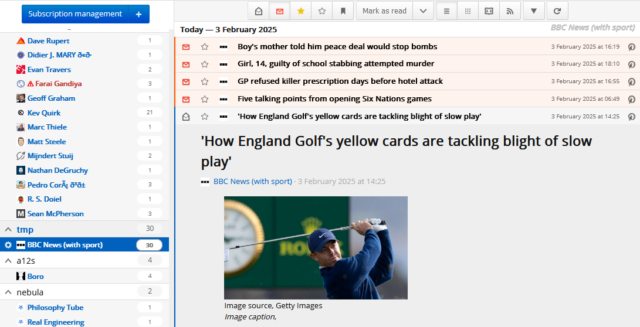
I shan’t be subscribing to this RSS feed, and I can’t promise I’ll fix it if it gets broken. But if “without the crap, but with the sports” is the way you like your BBC News RSS feed, I’ve got you covered:
So there you go, Allan, and anybody in a similar position. I hope that fulfils your need for sports news… without the crap.